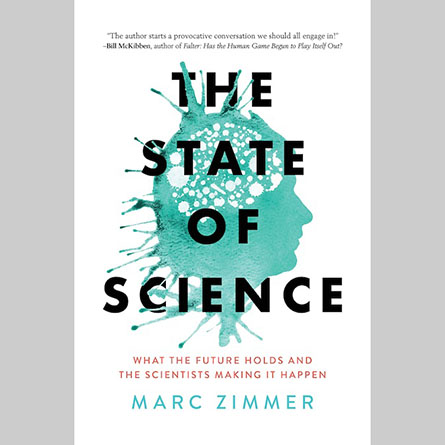
Professor Marc Zimmer explores ‘The State of Science’ in timely new book
In the midst of a global pandemic and a climate change crisis, science is growing faster than ever before. In his newest book, The State of Science, Chemistry Professor Marc Zimmer explores the research and innovations leading to life-changing and world-altering discoveries, the scientists at the forefront of these breakthroughs and the increasing politicization of the field that threatens to hamper progress.
Zimmer, the Jean C. Tempel ’65 Professor of Chemistry, has a knack for breaking down complex scientific processes and making them accessible to the general public, and he does so once again in The State of Science, his sixth book.
He introduces readers to the scientists working on renewable energy sources, meat alternatives and carbon dioxide sequestration to address climate change, even as climate change deniers and the politicization of funding threaten the work. The book also explains how CRISPR, (Clustered Regularly Interspaced Short Palindromic Repeats) repurposes bacterial defense systems to edit genes, which can change the way we live, but also presents real ethical problems; and how optogenetics will help neuroscientists map complicated neural circuitry deep inside the brain, shedding light on treating Alzheimer’s and Parkinson’s disease.
Finally, Zimmer investigates phony science, ranging from questionable “health” products to the fervent anti-vaccination movement; explores the rise of women in STEM fields; discusses the importance of U.S. immigration policies to science; and touches on new, unorthodox ways of DIY science and crowdsource funding, resulting in a wide-ranging book that showcases where science is, where it is heading and the people who are doing the work.
“The State of Science makes a compelling case for the importance of science, especially in times when politically undesirable observations can quickly be labeled ‘fake news,’” writes reviewer Rita Strack, senior editor of the scholarly journal Nature Methods. “It then maps the trajectory of science as a whole, including how emerging areas such as do-it-yourself science are posed to shape the landscape of the scientific endeavor. Zimmer deftly covers increasingly important technologies including artificial intelligence, gene editing and optogenetics, leaving readers with a clear sense of how these tools will impact biology and medicine.”
The work is particularly timely as scientists race to understand and combat the worst global pandemic since the 1918 flu amidst a flurry of political influence and deepening public skepticism.
“There is no doubt science has become politicized. Even before COVID-19 and climate change, vaccination science and GMOs have been highly politicized, which I address in The State of Science. Pandemics and catastrophes tend to hasten change and push us to extremes, and that is what is happening with COVID and the associated politicization of science,” Zimmer said.
“Additionally, science and medicine aren’t designed to go this fast. To find a COVID-19 vaccine or cure, we have to work faster than we have ever before. In science, we devise theories, do experiments, publish the results and then other scientists refine the theories or prove them wrong. Science isn't always right. That is okay—that is the way science works. But as a result, scientists tend to be careful in making blanket statements. This results in the media, politicians and people believing the louder ‘more confident’ non-experts.”
Zimmer says part of his motivation for writing the book was to help people understand the scientific process and better distinguish between fact, fiction and opinion.
“I wrote this book to show that science is cool. Deep learning, CRISPR and gravitational wave detection are amazing areas of science that look like science fiction, even though they are not. But, I also want to show that progress always involves increased risk,” he said.

